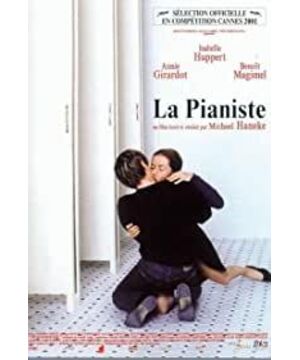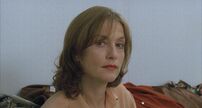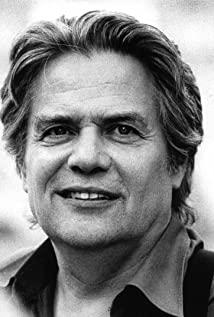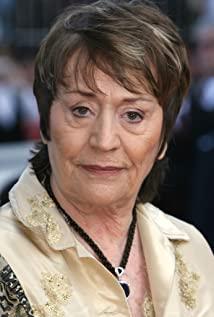Among the piano-themed music films, there is hardly a more dull and depressing film than "Piano Teacher". In the intermittent broken movement, we approached her and her mother's dull and depressing life, watching her nervousness, her morbidity, the surging lust and hatred under her calm expression. Until this twisted human nature destroys self-esteem and love. After some tossing, others had already stood in the sun again, leaving her to carry her scars to guard her pain alone.
The film is adapted from the masterpiece of the same name by the writer Jelinek. In addition to a large number of wonderful music comments and experiences, the original work also has extremely delicate and profound psychological descriptions. The 40-year-old female teacher lives under the strong constraints of her mother and is extremely depressed. The lust for her pushed her life into two extremes: the rational tranquility of music teaching and the twisted morbidity of venting her lust. Like black and white piano keys, it played the vibrating melody of her tragic life. The director uses a close-up of the face in a fixed position to accurately capture the subtle changes in the character's expressions and movements, thus expressing the deep and undulating female psychology in the original work.
Lead actor Isabelle Huppert navigates this contradictory role with superb acting skills. She has almost no expression in the whole film, whether it is the disappointment of the students' performance, the provocation of young men, the excitement of admiring the lover, the powerful hatred of the rival, or the scheming to hurt the students or try to assassinate the lover, her face is cold, only With the twitching of the corners of the mouth and the entanglement of fingers and other subtle movements, the inner surging emotions are shown restrainedly.
When the young man took the exam in order to get close to her, she sat alone in a corner away from the crowd. On the one hand, her heart agitated because of her admiration, but on the other hand, she pretended to be indifferent and refused admission. The director used a still shot with a rigid composition to focus on her, who was sitting silently between the desks and chairs, her body was still, but her hands were rubbing under the table. This restraint reflects her pervertedness and heterogeneity in venting her lust and expressing her emotions. In the slow plot, the audience is initially getting used to her indifferent personality and repressed life, but suddenly needs to face her self-abuse in the bathroom for lust, squeezed by a large number of men to watch porn alone, and in the car The scene of the movie peeping at others. Such an abrupt change deepens the tragic color of the story itself, and also makes the audience experience extremely uncomfortable movie-watching emotions.
Music is an integral part of the film, although many piano-related films have larger and tragic themes than The Piano Teacher. For example, the interpretation of loneliness and fate in "The Pianist at Sea", the heavy gloom of war and death in "The Pianist", and the hopeless but decisive love in "The Piano Lesson". But these films at least have melodious tunes and brief bright moments, the jazz piano jumping cheerfully, the Nazi officer revelling in the silence of the piano, or the children and men on the beach indulging in music. But "Piano Teacher" has almost no such rest time. When the piano sounded, it was either her teaching with students in a tense confrontation, or the jerky temptation and provocation between lovers. There is also a lack of soothing and melodious melody in the tune, instead it is full of dissonance, rendering the film's neurotic and awkward atmosphere.
In the original book, Jelinek discusses society and gender relations in a language that shines with wisdom. The film cannot achieve such depth and breadth, so it simplifies the discussion about human nature and music, and omits the story of his parents. The plot focuses on the personal fate of female teachers as they come of age. Her tragedy stems from the two kinds of powers presented in the film, the extreme oppression from her mother, living in the same room, sleeping in the same bed, not allowed to wear fashionable clothes, not allowed to go out for a long time, and more specific and specific details of life. Intensive demands, living in the shadow of her mother like a slave, can be described as a great insult to a 40-year-old adult woman. What lies in the dark is the repression of male power. She failed in the competition and had to condescend to be a piano teacher. Her status as an "older leftover girl" was under strong social pressure. Without dating and sex, music became Rugged and unique case. Her arrogance and sternness and the strange eyes of others are like two fortified castles, and there is no possibility of reconciliation. She appeared in a position far away from the crowd many times. The director also used the camera lens to show her opposition to society. For example, in the scene of entering a pornographic theater, she wore a high-necked coat and walked past the noisy coffee table and amusement hall. The loud and flowing background set off her frosty expression; and when she pushed open the glass door and fled the ice hockey rink in embarrassment, the camera followed her back, and there appeared a girl gliding gracefully on the ice, her youthful body exuding Her humiliation was further accentuated by her enthusiasm.
She is not submissive, but is constantly looking for ways to resist. She secretly buys revealing clothes in the closet, hurts her body alone, and inflicts direct violence on her mother, all of which are her efforts to resist the centralized parental authority; and enter pornography alone. Movie theaters, voyeuristic car sex is a blatant confrontation with the rules of a patriarchal society. She resisted and covered up the misery with a deadpan expression, but in the end she could only get away with running away.
In addition to the indecent elements of age, her feelings for young people are also full of feelings of releasing hatred and continuing confrontation. While obsessed with the sunshine and optimism of young people, she cannot get rid of her long-standing indifference and strong impulse to control others. The emotional chase similar to the "cat and mouse game" before seems to be teasing each other, but then the film shows the five contacts the two have had, which outlines the running context of this emotional struggle. The first game in the toilet is entirely dominated by female teachers. She played with the desires of the youth, not giving up but keeping her distance, rudely continuing but rejecting his orgasm. This kind of control is like playing with pets, and it is she who transfers and maps the power repression to the youth. The young man endured the toying.
Later in the female teacher's home, she maintained the same style, but angered the youth with a long letter exposing her masochistic tendencies. The confession in the letter was her way of expressing sincerity, but at the same time it exposed her strong intentions and lustful shadows. In the next three games, the status of the two sides changed rapidly. After years of depression and distortion, she could no longer bear normal sex, and even resented vomiting. This has become a turning point for the youth to counterattack and regain male power. Scene 4 is the climax of their relationship, not an emotional one, but at the heart of the dramatic conflict. He abused and insulted the female teacher in his own way, while declaring, "You can't insult a man like this." He made her understand that the dominant force of men cannot be violated, and she more directly recognized her own vainness and distortion, and all fantasies were destroyed. Crushed by pain and scars. That was also the moment when she was completely defeated by force. The last assassination plot was just the end of a failed period. Holding a dagger, she found that her former lover and once hurt rival had forgotten the haze and stood under the sun again. Only she was alone in the shadow of self-righteousness. Inextricable. She stabbed the dagger into her shoulder (in the original book, it was pierced into the chest, which seems to have a stronger symbolism), and the blood stained the coat into a red flower. Wearing this decoration, she walked out of the auditorium and walked back to her soul corner, looking forward to the redemption that may never come.
It is not uncommon for films with the theme of personality distortion caused by a broken family, and crime films that use this trick are even more common. The film has added more delicate and diverse clues, and it is difficult for the audience to make a clear value judgment on the characters in the film. Power is certainly worthy of condemnation, and she may be worthy of sympathy for being suppressed by birth, but can it be forgiven if it is twisted to hurt others and destroy the girl's piano dream with a conspiracy? The teasing and teasing of a lover is disgusting, but who has the heart to say "deserved" to her broken fantasy, exhausted and weak? The end of the film expresses endless despair, perhaps accusing the centralization of power with the individual tragedy of the female teacher, or it may only be presented objectively. The piano clue is reminiscent of the former murderer Yao Jiaxin, and the same controversy did not follow the end of the young life. Can closeness to music really wash away the shadows of the soul? Could art be a prop to mask sickness? These propositions may become the extension of the film, providing viewers with a broader thinking space.
View more about The Piano Teacher reviews











